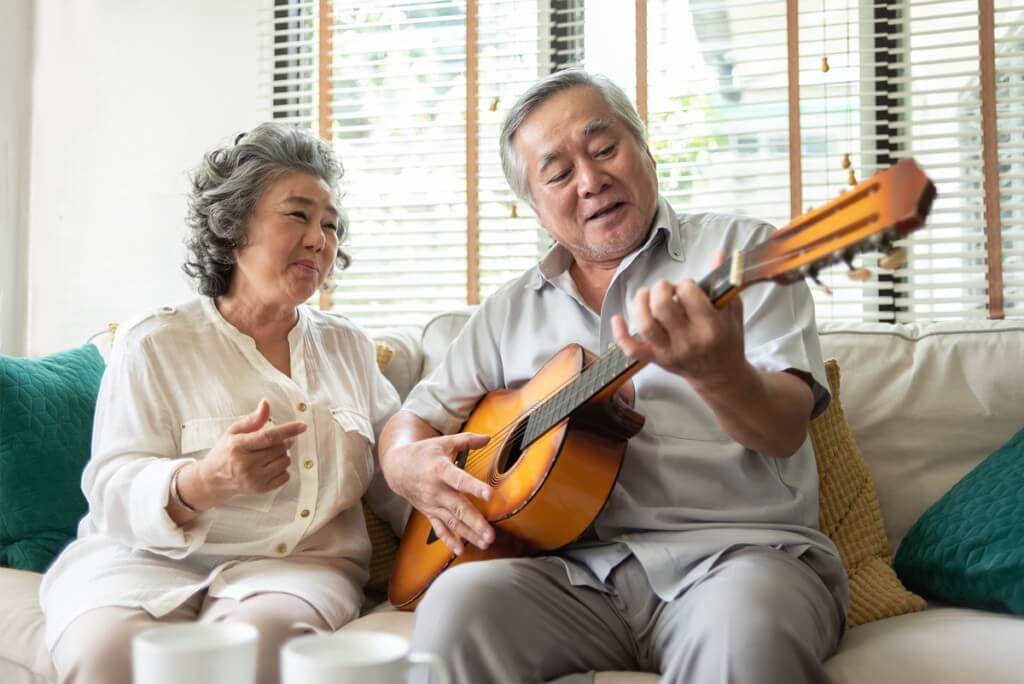Retirement Hobbies: Why You Should Learn to Play a Musical Instrument

Retirement hobbies can offer a gateway to newfound passions and pursuits, with learning a musical instrument standing out as a particularly enriching endeavor.
We think of music as an art form, but it’s so much more than that. It touches us in ways ordinary speech doesn’t and elicits feelings we often didn’t know existed. And when we play an instrument and create the music ourselves, it can absolutely change us – for the better.
So, if there’s a musical instrument you’ve always wished you could play, now’s the time to learn. It’s a misconception that learning an instrument is only for young people. In fact, researchers have discovered that it has many advantages for a senior’s health and well-being. Here are some of the benefits of learning to play an instrument.
How does playing a musical instrument affect the brain?
When you’re at the gym or fitness center, circuit training involves moving from one exercise machine to another, providing a total body workout. Music is one of the few activities that can do the same for your brain. Most activities use only a few areas of the brain at a time. When we play music, multiple areas of our brain become engaged and active simultaneously. Playing an instrument is a total brain workout.
Learning, and playing, an instrument is a rich and complex experience. Integrating information from the senses of vision, hearing and touch, along with fine motor movements, can result in long-lasting changes in the brain.
Studies have shown that musicians have higher IQs than non-musicians and have superior working memory.
One study had seniors practicing piano three hours a week for three months. At the end of the experiment, the seniors showed an improvement in processing speed and memory, while the control exhibited no changes. There’s also a growing body of work that suggests the simple act of learning something new can reduce the effects of dementia.
Relieves stress
Neurological research has shown that performing music stimulates many parts of the brain, including centers for memory and emotion in the limbic system. And playing music can increase levels of feel-good neurotransmitters like dopamine and serotonin. In other words, making music feels good and relaxes us. There’s nothing like tickling the ivories or strumming a few chords to ease your mind.
At Meadow Ridge, nestled in the serene landscape of Redding, CT, residents discover a vibrant tapestry of retirement living that fosters exploration and engagement. With a commitment to holistic well-being, Meadow Ridge provides an ideal setting for retirees to delve into the realm of musical expression.
Builds self-esteem
Learning an instrument is one of the best ways to build your confidence. For starters, it is something that you can do from the comfort of your home, at least in the beginning. There are countless online courses that can teach you anything from guitar and piano to electronic music production.
As you set, and meet, goals in learning an instrument, you’ll feel a sense of accomplishment and pride. When you hear your favorite tunes coming from your fingertips, it’s an experience that never grows old.
Provides opportunities for socialization
Learning an instrument is a great way to meet people, such as your teacher or other musicians. But as you continue to make progress, you’re bound to meet others who share your passion for the instrument you play or the style of music you enjoy.
At Meadow Ridge, music serves as a unifying force, bringing residents together in shared moments of creativity and joy. Whether participating in a choir, forming a band, or attending musical outings, retirees forge meaningful connections and cultivate lifelong friendships through their shared love of music.
Meadow Ridge recognizes the profound impact of music on overall wellness. Through a diverse array of activities and events, residents have ample opportunities to engage with music. From group lessons and ensemble performances to intimate recitals, the community celebrates the transformative power of musical expression.